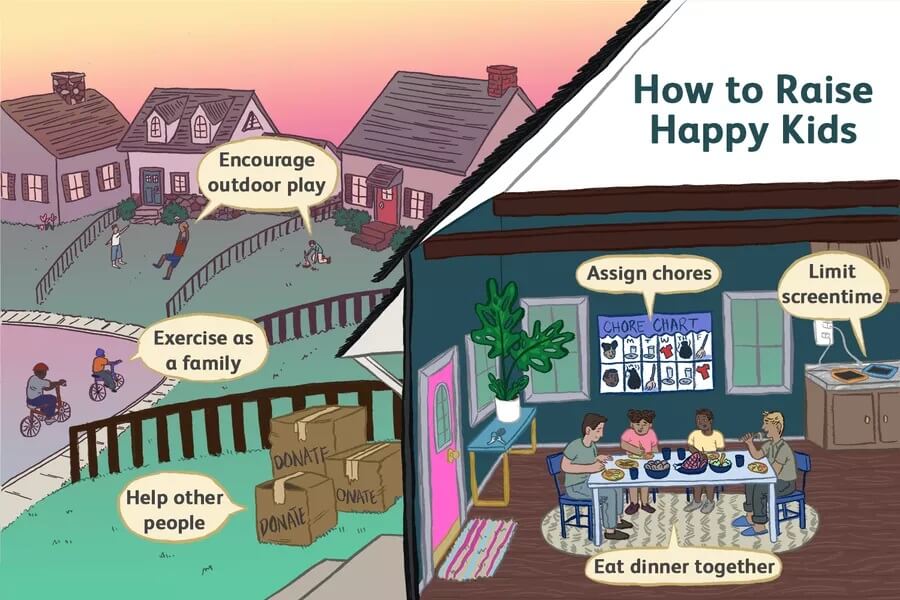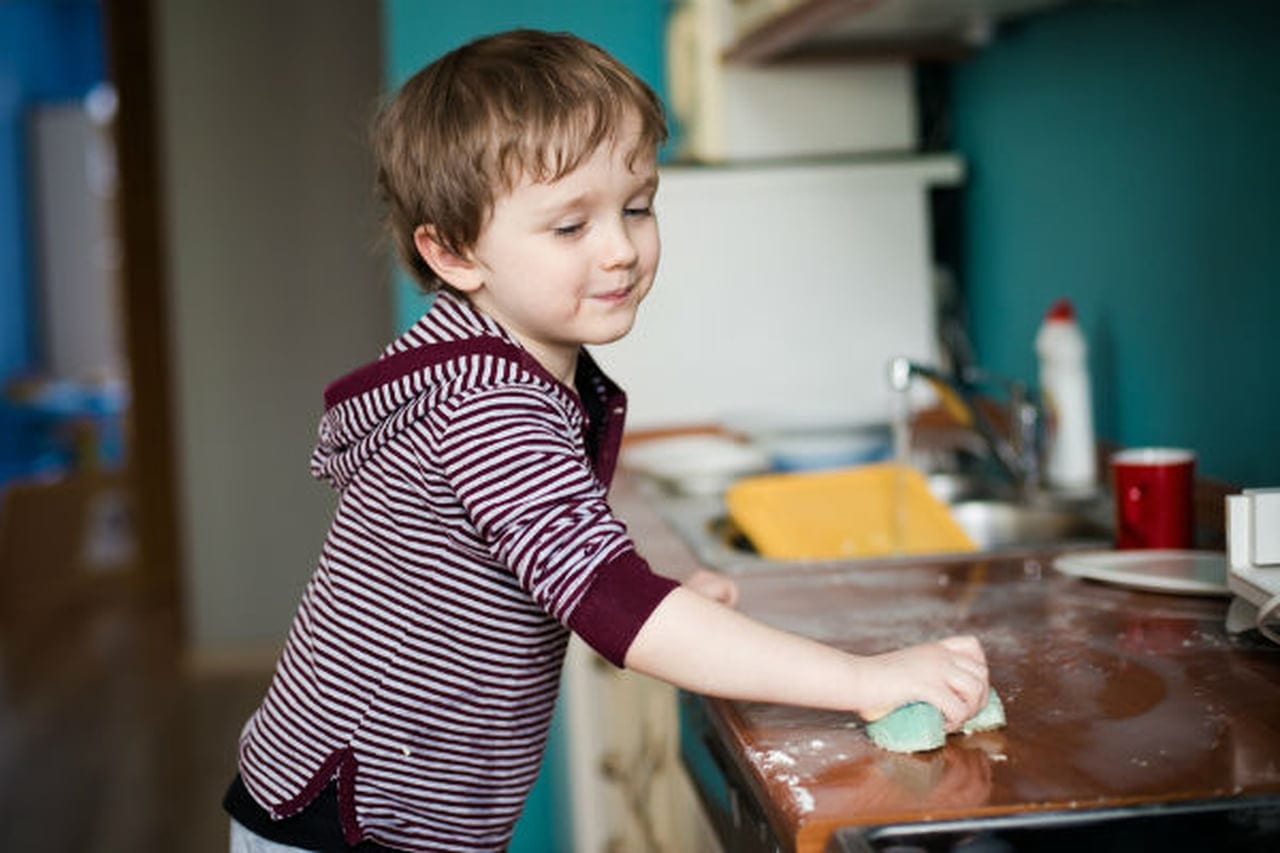Giving your children happiness It can prepare them for a healthy childhood and for success in life. But many parents wonder, how exactly do you raise happy children in today's world?

Raising happy children doesn't mean giving them temporary pleasure or instant gratification. In fact, it's quite the opposite.
Happy children possess a set of skills that enable them to enjoy long-term happiness in life. They are capable of instant gratification in an effort to achieve their goals.
You can help your children develop these skills by adopting lifelong healthy habits. Here are 10 ways to raise happy children.
Encourage outdoor play
Don't underestimate the power of outdoor play. Running on the grass, climbing trees, sitting on a swing, and digging in the dirt are all good for kids.
Studies show that scents associated with nature, such as pine trees, cut grass, and lavender, can boost your child's mood. So, you might encourage your child to read a book outside or do homework on the porch just to give them an instant boost of happiness.
Playing outdoors can improve children's social skills. A 2017 study published in the Journal of Science and Medicine in Sports found that children who increased their outdoor play time increased their empathy, engagement, and self-control—vital social skills.
Children with better social skills are more likely to have healthy relationships. One study found that children with better social skills were twice as likely to attend college and less likely to experience substance abuse, obesity, and violence.
So make outdoor play a daily habit. Even when the weather isn't ideal, encourage your kids to ride their bikes, play with neighborhood kids, and run outside.
Screen time limit
Your child may insist on playing for long hours. video games It makes him happy. But a lot of Screen time Bad for your child's psychological well-being.
A 2018 study published in the journal Emotion found that teens who spent less time on their digital devices and more time on non-screen activities, such as sports, homework, religious services, and other personal activities, were happier.
Set clear limits on your child's screen time. If they have a smartphone, restrict their access to it when doing family activities, riding in the car, or playing outside. Set clear guidelines about the amount of time they can spend watching TV and using the computer.
practice gratitude
Incorporating gratitude into your daily life can help children become happier and healthier. However, keep in mind that there's a big difference between forcing "thank you" and actually saying it.
A 2012 study on gratitude found that grateful people have better relationships—and that could be the key to a happier life. One of the best ways to help children be truly grateful is to model gratitude.
Express sincere gratitude when you are grateful to someone else. Expressing gratitude for the things your children do will teach them to do the same.
Make it a family habit to talk about the things you're grateful for. List three things you're grateful for at the dinner table or talk about how you feel at bedtime. This will help your children learn to look for things to be grateful for in their daily lives.
Make it a habit Send feedback Thank you Also, instead of just signing their name, encourage your child to identify something specific they want to thank someone for.
You don't have to keep thank-you notes for gifts either. You might encourage your child to write a thank-you note to a teacher for their help during the school year, or you might write a note to a coach who was particularly kind.
They have high expectations – but not too high.
While it's not fun to spend hours studying for a test or practicing an instrument, kids who strive to do challenging things are more likely to live happier lives.
Your expectations have a huge impact on your child's willingness to challenge themselves. Your children will work hard to meet your expectations as long as they are reasonable.
Studies show that when parents have high academic expectations for their children, children do better in school and persist longer on challenging assignments. High expectations are also linked to academic and social resilience.
But it's important to note that you shouldn't expect perfection. Setting your child's ambitions too high is likely to backfire.
Expecting your child to be perfect may increase your child's risk of mental health problems. Your child may also abandon their goals if they feel you've set the bar too high.
Teaching self-control
Eating an extra cookie, skipping homework to have fun with friends, and watching TV instead of doing chores may give children temporary pleasure. But, in the long run, a lack of self-control does more harm than good.
A 2014 study published in the Journal of Personality found that people with better self-control report better moods.
Interestingly, however, researchers found that people with better self-control didn't put themselves in tempting situations as much as other people. They essentially set themselves up for happiness.
Start teaching your child self-discipline at an early age. At the same time, teach her not to surround herself with too many temptations.
Some ways you might help her do this could include:
- Put a basket in the kitchen for smartphones. Tell your child to put their smartphone in the basket when you're doing homework so they won't be tempted to browse the internet when they're supposed to be doing work.
- Stock your refrigerator and cupboards with healthy food options. If you have some candy at home, make it harder to find it by placing it on high shelves or at the back of the pantry out of sight.
- Put all electronic devices in a common area of the house before bedtime. This way, your child won't be tempted to use their tablet or phone while they're in bed.
Business allocation
Your kids won't love clearing the table or cleaning the living room right now, but assigning chores can be a key factor in helping them achieve long-term happiness.
One study found that giving children chores at ages 3 and 4 was the greatest predictor of long-term success.
Children who do chores may feel they are striving for it and help them feel more connected to their families. This sense of connection may help them stay mentally strong when facing difficult times.
Chores can also teach children a variety of life lessons, such as responsibility and community service. They may also learn that they are capable of handling boring tasks or that they can persevere even when they feel frustrated.
Making their beds and cleaning the kitchen can also give them a sense of accomplishment and show them that even though they are young, they are capable of making a difference.
Assign regular chores and expect your children to complete them. This will help them learn life skills that will help them live happier lives as adults.
eating dinner together
When kids have sports practices, games, and other extracurricular activities, it can be tempting to grab something on the go and eat at different times. But eating as a family may be one of the best things you can do if you want to raise happy kids.
One study found that frequent family meals was strongly associated with positive moods in adolescents. Another study found that adolescents who ate meals with their families had more positive views of the future.
Family meals may also promote good health. Children who eat with their parents are less likely to be overweight or develop eating disorders. Teens who eat dinner with their parents are also less likely to experience substance abuse or behavioral problems.
If you can't get together for a family meal every night, don't worry. Most studies have found that children benefit from eating with their parents a few nights each week.
Avoid over-indulging your children.
Buying your child too many gifts for the holidays or giving them everything they want won't make them happy. In fact, overindulging children can actually affect their psychological well-being.
Some research suggests that children with hyper-impulsiveness are more likely to experience chronic feelings of discontent. They may have difficulty distinguishing between needs and luxuries, and may therefore believe that happiness comes from material goods.
So resist the urge to give your kids everything they want. While they may insist that the latest smartphone, more designer clothes, and a better bike will make them happy, research suggests otherwise.
Give them the opportunity to earn privileges. They'll appreciate things more when they have to work hard to earn something, rather than having everything handed to them.
Focus more on experiences rather than things. Studies show that happy people spend their time and money creating memories, not collecting more items.
Exercises as a family
Whether you decide to go for an evening walk together as a family or do exercise videos from the comfort of your living room, exercise can make everyone in the family happier.
A 2018 study in the Journal of Happiness Studies found that the type of exercise didn't matter. Aerobic exercise, stretching, balance training, and weightlifting all provided a boost to happiness.
But you might think there's no need to exercise together—after all, your child probably gets exercise on vacation or through sports activities. But exercise will likely make you happier.
last word
Keep in mind that children don't need to be happy all the time. In fact, they need to experience deeply uncomfortable emotions, such as sadness, anger, fear, and disappointment.
There's no need to encourage your children or take action when they experience uncomfortable feelings. Instead, coach and help them find ways to calm themselves and cope with their emotions.
It's not a reflection if they aren't happy every minute of the day. It's not your job to be responsible for your children's happiness. Instead, it's up to you to provide your children with the skills they need to manage their emotions in a healthy way.
Finally, the best thing you can do to help raise happy children is to provide them with a loving environment. Children who know they are loved and cared for are more likely to thrive, even when faced with challenging life circumstances.










